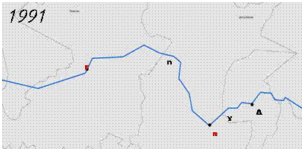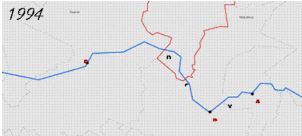Project Summary
In this study we examine the effect of political decentralization on spillovers across jurisdictional boundaries. Upstream water use has spillover effects on downstream jurisdictions, and greater decentralization (i.e. a larger number of political jurisdictions managing the same river) may exacerbate these spillovers, as upstream communities have fewer incentives to restrain their members from polluting the river at the border. We use Geographic Information System (GIS) data combined with a panel dataset of 9,000 water quality measures collected at 321 monitoring stations across Brazil with maps of the evolving boundaries of the 5500 Brazilian counties in order to study (a) whether water quality degrades across jurisdictional boundaries due to increases in pollution close a river’s exit point out of a jurisdiction, and (b) what the net effect of a decentralization initiative on water quality is (once the opposing impacts of inter-jurisdictional pollution spillovers and increased local government budgets for cleaning up the water are taken into account). We take advantage of the fact that Brazil changes county (municipio) boundaries at every election cycle, so that the same river segment may cross different numbers of counties in different years.
Example of Municipio Splitting


Our findings demonstrate evidence of strategic enforcement of water pollution regulations; there is a significant increase in pollution close to the river’s exit point from the upstream county, and conversely a significant decrease in pollution when the measure is taken farther downstream from the point of entrance. Pollution increases at an increasing rate as we get closer to the border. The greatest polluting activity appears to be very close to the exiting border. Our theoretical model, coupled with the empirical results, strongly suggests that these results are evidence of strategic spillovers rather than a spurious correlation between county splits and pollution stemming from changing population density.
These results suggest that decentralization policies promoted by government and international organization may come at an efficiency cost when local jurisdictions provide public services with inter-jurisdictional spillovers. Solutions to water conflicts across borders may require active regulatory involvement by upper-level bodies, or the creation of a forum for negotation and cooperation, as compenstation in the form of direct inter-jurisdiction financial transfers may not be practically or politically feasible.
Research Partners:
Molly Lipscomb (U. of Virginia)
Research Papers
M. Lipscomb and A. M. Mobarak, “Decentralization and Pollution Spillovers: Evidence from the Re-drawing of County Boundaries in Brazil,” Review of Economic Studies, 84 (1): 464-502, January 2017
Abstract: Decentralization can improve service delivery, but it can also generate externalities across jurisdictional boundaries. We examine the nature and size of water pollution externalities as rivers flow across jurisdictions. Panel data on water pollution in Brazilian rivers coupled with county splits that change the locations of borders allow us to identify the spatial patterns of pollution as rivers approach and cross borders, controlling for fixed effects and trends specific to each location. The theory of externalities predicts that pollution should increase at an increasing rate as the river approaches the downstream exit border, that there should be a structural break in the slope of the pollution function at the border, and that a larger number of managing jurisdictions should exacerbate pollution externalities. We find support for all four predictions in the data. Satellite data on growth in night-time lights along rivers show that local authorities allow more settlements to develop close to rivers in the downstream portions of counties, which is the likely underlying mechanism. The border effects on pollution are not as pronounced when the cost of inter-jurisdictional coordination is lower.
